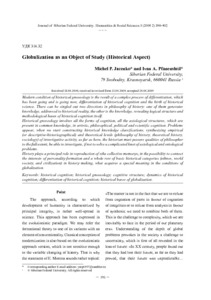Globalization as an Object of Study (Historical Aspect)
Скачать файл:
URI (для ссылок/цитирований):
https://elib.sfu-kras.ru/handle/2311/1010Автор:
Jacenko, Michel P.
Pfanenshtil, Ivan A.
М.П. Яценко
И.А. Пфаненштиль
Дата:
2009-08Аннотация:
Modern condition of historical gnoseology is the result of a complex process of differentiation, which
has been going and is going now, differentiation of historical cognition and the birth of historical
science. There can be singled out two directions in philosophy of history: one of them generates
knowledge, addressed to historical reality, the other is the knowledge, revealing logical structure and
methodological bases of historical cognition itself.
Historical gnoseology involves all the forms of cognition, all the axiological structures, which are
present in common knowledge, in artistic, philosophical, political and scientific cognition. Problems
appear, when we start constructing historical knowledge classifications, synthesizing empirical
(or descriptive-historiographical) and theoretical levels (philosophy of history, theoretical history,
sociology) of investigative activity, as far as here, the historian must possess qualities of philosopher
to the full extent, be able to investigate, if not to solve a complicated knot of axiological and ontological
problems.
History plays a principal role in reproduction of «the collective memory», in the possibility to connect
the interests of personality formation and a whole row of basic historical categories (ethnos, world
society, and civilization) in history making, what acquires a special meaning in the conditions of
globalization. Современное состояние исторической гносеологии является результатом того, что по-стоянно происходил и происходит сложный процесс дифференциации исторического познания и возникновение исторической науки. В философии истории выделяются как бы два направле-ния: один образует знания, обращенные к исторической реальности, другой – знания, выяв-ляющие логическую структуру и методологические основания самого исторического познания.
Историческая гносеология охватывает все формы познания, все познавательные струк-туры, присутствующие в обыденном знании, в художественном, философском, политическом и научном познании. Проблемы возникают при конструировании систематик исторического зна-ния, синтезирующих эмпирический (или описательно-историографический) и теоретический уровни (философия истории, теоретическая история, социология) исследовательской деятель-ности, ибо здесь историк в полной мере должен обладать качествами философа, способного распутать, если не решить, сложнейший клубок гносеологических и онтологических проблем.
История играет принципиальную роль в воспроизводстве «коллективной памяти», в воз-можности связать в историческом производстве интересы формирования личности с целым ря-дом базовых исторических категорий (этнос, мировое сообщество, цивилизация), что приобре-тает особое значение в условиях глобализации.
Коллекции:
Метаданные:
Показать полную информациюСвязанные материалы
Показаны похожие ресурсы по названию, автору или тематике.
-
Globalization as a Form of Historical Process and Axiology of History in Russia
Jacenko, Michel P.; М.П. Яценко (Сибирский федеральный университет. Siberian Federal University, 2009-08)In the given article we consider peculiarities of historical cognition under the conditions of globalization, of which one of the most important characteristics is a forceful interpretation of history. Here, we prove ... -
Integrated Sociology: Synthesis of Classical, Non-Classical and Post-Nonclassical Approaches in Cognizing the Society
Kuksa, Larisa P.; Л.П. Кукса (Сибирский федеральный университет. Siberian Federal University, 2009-03)The problem of sociological approaches for resolving the situation of the contemporary crisis of the man and society is considered in the article. The aspects discovered in classical, non-classical, and post-nonclassical ... -
The Revival of Psychological Anthropology: a New Understanding of Interrelation Between Cultural and Psychological By Virtue of Cognitive Anthropology and Cultural Psychology
Lourie, Svetlana V.; Лурье, С.В. (Сибирский федеральный университет. Siberian Federal University, 2017-07)The article deals with the history of psychological anthropology revival during the 80-s – 90-s of the XX century after the period of its decline. Psychological anthropology could no longer be regarded as a fully-fledged ... -
Interactivity of Simultaneous Interpreters as Actors of a Cognitive Event
Chistova, Elena V.; Чистова, Е.В. (Сибирский федеральный университет. Siberian Federal University, 2020-03)The paper refers to studying interactivity models of simultaneous interpreters in the field. It describes the process of simultaneous interpretation as a cognitive event considering two participants in the context of ... -
Interactivity of Simultaneous Interpreters as Actors of a Cognitive Event
Елена, Викторовна Чистова (2020-03)В статье рассматривается процесс синхронного перевода в контексте теории распределенного познания. Распределенный характер деятельности синхронных переводчиков подразумевает взаимообусловленность индивидов, языка, коммуникации, ...

